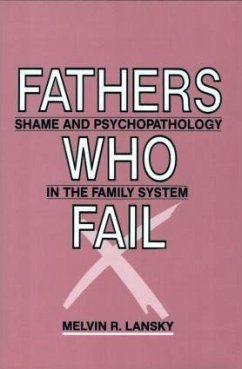Despite the burgeoning literature on the role of the father in child development and on fathering as a developmental stage, surprisingly little has been written about the psychiatrically impaired father. In Fathers Who Fail: Shame and Psychopathology in the Family System, Melvin Lansky, a psychiatrist, psychoanalyst, and family therapist, remedies this glaring lacuna in the literature. Drawing on contemporary psychoanalysis, family systems theory, and the sociology of conflict, he delineates the spectrum of psychopathological predicaments that undermine the ability of the father to be a father. Out of his sensitive integration of the intrapsychic and intrafamilial contexts of paternal failure emerges a richly textured portrait of psychiatrically impaired fathers, of fathers who fail. This portrait revolves around the dynamics of narcissistic vulnerability, shame, and humiliation in family systems. For Lansky, shame is "the veiled and silent companion of the narcissistic injury of men who see themselves as having failed in the paternal role", and such shame must be understood not only intrapsychically, but in terms of the regulatory mechanisms and defensive processes through which the family, as a system, maintains its narcissistic equilibrium. In explicating the role of shame as the master regulatory emotion of the sense of self in relation to others, Lansky masterfully synthesizes an array of heretofore discrete perspectives: Heinz Kohut's emphasis on shame as regulatory emotion ensuring continuity of self experience, Helen Block Lewis's understanding of the relationship between unacknowledged shame and rage, Melanie Klein's insights into the role of projective defenses within thefamily, and recent sociological contributions to the role of shame in conflict escalation. Lansky welds these and other viewpoints into an overarching perspective that situates the psychopathology of impaired fathers within the relational dynamics of the entire family system, including the nuclear family, the extended family, and the family over generations. By locating the impaired father's narcissistic vulnerability within a framework of intrafamilial conflict and disequilibrium, he is able to show how paternal shame both defends against, and represents the end-stage of, the breakdown of family bonds that previously contained paternal dysfunction. Lansky's probing discussion of narcissistic equilibrium in the family system enables him to chart the natural history common to the symptomatic impulsive actions of impaired fathers. He then considers specific manifestations of paternal dysfunction within this shared framework of heightened familial conflict and the failure of intrafamilial defenses to contain shame. Domestic violence, suicide, the intensification of trauma, posttraumatic nightmares, catastrophic reactions in organic brain syndrome, and the murder of a spouse are among the major "symptoms" that he explores. In each instance, Lansky carefully sketches the progression of vulnerability and turbulence from the father's personality, to the family system, and thence to the symptomatic eruption in question. In his concluding chapter, Lansky comments tellingly on the unconscious obstacles - on the part of both patients and therapists - to treating impaired fathers. These obstacles cut across different clinical modalities, underscoring the need for multimodal responses to fathers whofail. Fathers Who Fail cuts across disciplinary boundaries with the authority of a versatile senior clinician whose experience of several decades has convinced him that complex psychopathology cannot yield to any single clinical modality. Bringing within his purview the conceptual and methodological problems of collecting data about fathers and fathering, the personality of impaired fathers, the family systems that sustain and fail them, and the impact of paternal dysfunction on other family members, Lansky speaks in one integrative voice to all mental health professionals who wrestle with the individual, familial, and social dimensions of dysfunctional fathering. A landmark in the psychiatric, psychoanalytic, and family therapy literatures, Fathers Who Fail will be required reading as well for sociologists, family systems theorists, developmental researchers, and lay readers intent on grasping the widespread dilemmas and all-too-frequent tragedies of fatherhood in our time.








